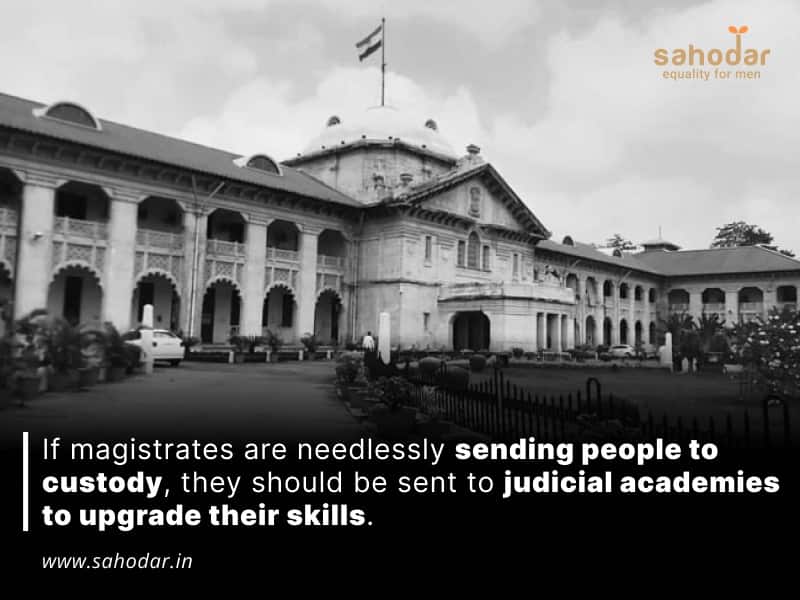The Court observed that the orders were predominantly issued by courts in Uttar Pradesh and directed that the Acting Chief Justice of the Allahabad High Court should be notified about it.
According to a panel of judges comprising Justices Sanjay Kishan Kaul, Ahsanuddin Amanullah, and Aravind Kumar, magistrates who unnecessarily order people to be detained should have their judicial duties taken away and be sent to judicial academies for training.
The judges criticized the practice of magistrates issuing orders that result in people being sent to custody unnecessarily and causing additional legal disputes. They stated that this is unacceptable, and it is the responsibility of the High Courts to ensure that lower courts follow the law.
The judges suggested that if any magistrates are found to be making such orders, their judicial work should be withdrawn, and they should be sent to judicial academies for skill development.
The bench stated that it is the responsibility of the High Courts to ensure that the lower judiciary follows the laws of the land. They observed that such orders were commonly being issued by courts in Uttar Pradesh, particularly in Hathras, Ghaziabad, and Lucknow.
The judges called on the counsel for the High Court of Allahabad to notify the Acting Chief Justice of the situation and issue appropriate directives to prevent such incidents from recurring. The court also suggested some of the measures outlined above to address the issue.
The Bench was presiding over a case related to the implementation of its previous ruling in Satender Antil, which emphasized the importance of adhering to provisions of the Criminal Procedure Code (CrPC) during arrests and trials.
In the previous ruling, the Bench had stressed the need for a new bail legislation and directed courts to decide bail applications within two weeks, unless otherwise specified by law.
The Bench had also stated that compliance with Sections 41 and 41A of the CrPC was mandatory, and failure to comply would entitle the accused to bail. Additionally, the low rate of convictions was noted as a possible factor in bail decisions.
The Bench had issued several directives, which were to be sent to all states and union territories, and they were given four months to file affidavits/status reports.
In a previous case, the Court had noticed a trend of continuous bail applications being filed after the final report due to a misinterpretation of Section 170 of the Code of Criminal Procedure. The Court had issued a judgment on this matter, but on Tuesday, it expressed disappointment that ten months later, there were still issues at the ground level. The Court directed the Registrars of the High Courts of Delhi, Telangana, Meghalaya, and Uttarakhand to appear at the next hearing for failing to submit compliance reports. The Court noted that the judgments had been brought to the attention of the trial courts but had not been implemented properly. Additionally, the Court pointed out cases where public prosecutors had taken a stance that contradicted the top court’s rulings on the matter.
The Bench was overseeing a case regarding the execution of its earlier decision in the Satender Antil case. The previous ruling emphasized the significance of following the Criminal Procedure Code (CrPC) during arrests and trials. The Bench directed the courts to decide bail applications within two weeks, unless otherwise stipulated by law. It also stated that adherence to Sections 41 and 41A of the CrPC was obligatory, and non-compliance would entitle the accused to bail. Additionally, the low conviction rate was mentioned as a potential factor in bail decisions. The Bench issued numerous guidelines, which were to be disseminated to all states and union territories, with a deadline of four months to submit affidavits/status reports.
On Monday, the top court referred to a judgment and highlighted the need to examine whether it is legal for trial courts to issue remand orders immediately upon the appearance of an accused. The court stated that this case itself is the appropriate one for examination, as previous directions have been misinterpreted as applying only to regular bail cases and not anticipatory bail. The court clarified that the directions regarding bail are equally applicable to anticipatory bail cases, which are a type of bail.
The court also directed states that have not issued formal standing orders regarding compliance with the judgments to do so within three weeks. If they fail to comply, their Home Secretaries will be required to personally appear in court.
In February, the Supreme Court expressed disappointment over the delay by four High Courts, the CBI, and most states in submitting status reports in a case. During the hearing, Senior Advocate Sidharth Luthra, who is now the formal Amicus Curiae in the case, pointed out several instances of non-compliance with the top court’s order in Siddharth v State of Uttar Pradesh. This order had clarified that trial courts cannot demand that accused persons be remanded to custody before taking cognisance of the chargesheet.
The Bench had instructed the High Courts to provide affidavits reflecting whether they were monitoring compliance with the order. Interestingly, the top court had also ordered that the judgments in Antil and Siddharth be included in the curriculum of judicial academies.
Source: https://www.barandbench.com/news/litigation/magistrates-sent-to-judicial-academies-supreme-court

